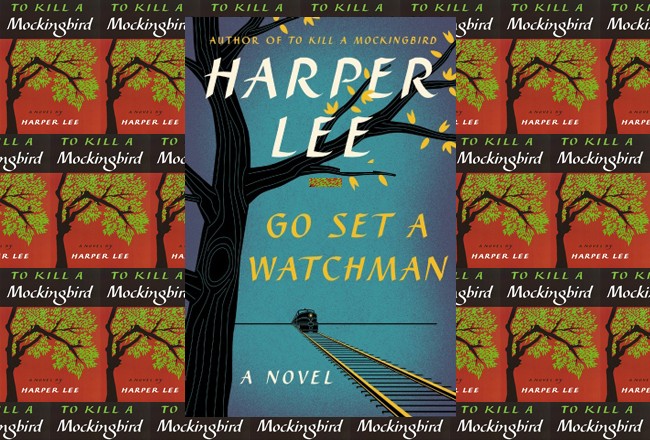
If Supreme Court decisions, world cups and presidential debates can be live-blogged, why not books? Welcome to a new-media experiment in reading: FlaglerLive’s live-blogging of “Go Set a Watchman,” the new and controversial novel by Harper Lee. We’ve invited 10 people of varied backgrounds from around the community to read the book and write their response to each of its 19 chapters, from whatever perspective they choose, at whatever length they choose. Starting today the responses will be published here in 19 installments over the next few weeks, roughly a chapter a day.
Judging from today’s contributions, you’re in for a wild read: some of these contributions are better than the book. And like Maycomb snowflakes, no two contributions are alike. None of the contributor-critics have read each other’s segments before publication (and I’m making a point of writing my own contributions before editing any of my colleagues’. so as not to be influenced by what they might say).
There’s no question that the book is problematic on many levels. But there’s no question either that it’s a cultural event and an opportunity to rediscover Lee, if not the act of reading communally without losing reading’s attraction as an essentially solitary thrill. I’m extremely grateful to the nine contributors who have agreed to take part in this project and put up with its daily demands. They are doing so for no more compensation than a copy of the book and the recurring aggravations of my hurry-up-and-write emails. (Special thanks to Brian McMillan, the editor of the Palm Coast Observer, for joining me in what I hope will be the first of many such collaborations.)
I’m especially grateful to the contributors for giving life to what the great Jorge Luis Borges once described in “Pierre Menard, Author of the Quixote,” one of his great stories. In that story, the mere act of reading a book subsequent to its creation makes it richer than even what its author intended simply because of what context, allusions, analysis and imponderables the reader brings to it. I don’t know of a better book than “Watchman” to go Pierre Menard on: unlike Quixote, “Watchman” needs improvement. Put in more Maycombish terms, this literary experiment is not much different than how Atticus taught Scout to crawl in a person’s skin to better understand other perspectives back in “Mockingbird.” These contributors are allowing us to read the book with their eyes, giving us the pleasure of 10 books rather than one. And who knows, Jorge Luis, this may well be the beginning of a beautiful friendship with live reading.
We welcome your input if you’d like to do likewise. Each day we’ll start this feature with a brief summary of the chapter at hand (spoiler alert) then go straight into our contributors’ reactions since, to quote Harper Lee, introductions “inhibit pleasure, they kill the joy of anticipation, they frustrate curiosity.” So let’s get to it.
–Pierre Tristam
![]()
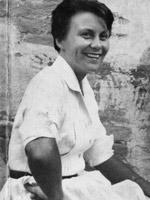
- Today’s Chapter Summary
- Bill McGuire
- Brian McMillan
- Mary Ann Clark
- Jon Hardison
- Monica Campana
- Darrell Smitty Smith
- Jay Livingston
- Inna Hardison
- Daniel Masbad
- Pierre Tristam
![]()
Chapter 1 summary: It’s the mid-1950s. Jean Louise Finch is 26, roughly a couple of decades older than she was in “To Kill a Mockingbird.” She’s moved to New York City. She is returning to Maycomb for her annual visit, by train as opposed to plane this time. Brother Jem died suddenly two years earlier. Calpurnia the maid is gone. Atticus is 72 and suffering of arthritis, though it’s Henry Clinton, Jean Louise’s “lifelong friend, her brother’s comrade,” lawyer and partner in Atticus’s firm, not her father, who is waiting for her at the station. “There was no finer young man, said the people of Maycomb, than Henry Clinton,” but that Clinton thinks nothing of lovingly molesting Jean Louise on the platform and asking her, not for the first (or fifth, and possibly tenth) time, to marry him. “I’ll have an affair with you but I won’t marry you,” she tells him with that Finch directness as they drive to Atticus’s home.
 Bill McGuire, Palm Coast City Councilman and management consultant: I love to read. I will typically read at least two or three books a week, mostly fiction. When reading a work of fiction, especially if I am not familiar with the author or the characters in the novel, I will look for one of two things as I begin the book. Often times, the introduction or preface will give you a hook by presenting a climactic moment within the story that will make you want to see how it turns out and what leads up to it. Failing that, I look to the first hundred or so pages to see if the characters are interesting to me, such that I want to place myself vicariously at their side as the novel progresses.
Bill McGuire, Palm Coast City Councilman and management consultant: I love to read. I will typically read at least two or three books a week, mostly fiction. When reading a work of fiction, especially if I am not familiar with the author or the characters in the novel, I will look for one of two things as I begin the book. Often times, the introduction or preface will give you a hook by presenting a climactic moment within the story that will make you want to see how it turns out and what leads up to it. Failing that, I look to the first hundred or so pages to see if the characters are interesting to me, such that I want to place myself vicariously at their side as the novel progresses.
In the first two chapters of this book, I have not found where the story is likely to go, I have not found a description of the town and its culture that is interesting and, thus far, the characters are boring, if not downright obnoxious. Jean Louise Finch is a snotty twentysomething bitch; why her paramour Henry is interested in her is a mystery. Atticus Finch is an elderly man approaching his dotage with nothing particularly interesting about him thus far and his sister Alexandra is equally nondescript.
I’m going to give this book at least 100 pages to see if a plot develops that is interesting – I’m not being fair to the author having read only two chapters, but the slow start is almost Dickensian and it’s frustrating to me. Okay, I’m going to read the whole book, stay tuned.
 Brian McMillan, columnist and executive editor of the Palm Coast Observer: As I’m reading the first chapter of “Go Set a Watchman,” I admit I’m feeling sort of giddy because of the literary event that the book has become. I’m not all that focused on the legality or the ethics of the book’s publication; I’m staying blissfully ignorant of all that. Instead, I’m enjoying the rare day when many people in our country are sitting around reading the same book. When else does this happen? Thanks to Pierre Tristam for arranging for it to happen here in Flagler County, as well.
Brian McMillan, columnist and executive editor of the Palm Coast Observer: As I’m reading the first chapter of “Go Set a Watchman,” I admit I’m feeling sort of giddy because of the literary event that the book has become. I’m not all that focused on the legality or the ethics of the book’s publication; I’m staying blissfully ignorant of all that. Instead, I’m enjoying the rare day when many people in our country are sitting around reading the same book. When else does this happen? Thanks to Pierre Tristam for arranging for it to happen here in Flagler County, as well.
I feel so conscious of the act of sitting in my arm chair and reading as a result of all this hype. I’m thinking about the magic of creating an imaginary world and all the techniques that Lee is using to pull it off. I’m also feeling like I’m getting reacquainted with people I already know. Because of “To Kill a Mockingbird,” just about every American knows who Atticus Finch is, and now that I am meeting him again, it’s bringing him to life even more. There is no need to introduce him, only to catch up, like we’re bumping into each other at a family reunion.
I see chapter 1 as a character study of Jean Louise, formerly known as Scout. The first chapter is tightly executed, for the most part, with every detail seeming to work toward revealing aspects of her character.
Jean Louise is a loving daughter; she recognizes that it’s “no longer fair” to expect her father to come to meet her at the train station at 72 years old.
She is also a sexual entity now that she’s an adult. She’s no longer overalled and boyish; now she’s a grown woman who sleeps only in pajama tops and tells her friend that she’ll have an affair with him but not marry him.
We then get a few pages of the history of Maycomb, which I find to be less tightly executed, but probably necessary for the development of the themes of race and history and place.
But then we have several pages of a fun conversation between Jean Louise and Hank, who greets her with a kiss on the mouth, proposes marriage, and then they agree that she’s hateful and settle into being just friends. Still, we can’t fully believe her when she says she will “pursue the stony path of spinsterhood.”
“Mockingbird” was built on a neat little package of Truth, and that is that you can’t know a man until you walk around in his moccasins. It’s the kind of novel that was written to be read in my high school classroom, with my teacher’s obsession a clearly stated theme. But Lee’s simplicity is refreshing in a world of winking irony and Deconstruction.
In “Watchman,” too, Lee is brave enough to use the story to impart some wisdom about human nature. One place we see that in chapter 1 is toward the end of Jean Louise’s reunion with Henry, when she attempts to assess her love for him. Is she in love with him a little? No, she thinks, that’s impossible. “Either you are or you aren’t. Love’s the only thing in this world that is unequivocal.”
I like reading a novel with some ambition, a novel that has something to say. I’m glad this author has been resurrected in 2015, at a time when we can use her trademark “themes.” Harper Lee is not too cool for Truth.
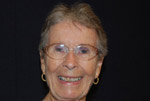 Mary Ann Clark, founder of Flagler Reads Together and president of the Flagler County Historical Society: The first chapter took me back to the days of riding trains with hotboxes, friendly conductors and porters and getting dressed up to go traveling. Miss Jean Louise doesn’t seem to have changed from being a self-reliant girl. Her vision of her future life as a married woman is very different from that current at the time.
Mary Ann Clark, founder of Flagler Reads Together and president of the Flagler County Historical Society: The first chapter took me back to the days of riding trains with hotboxes, friendly conductors and porters and getting dressed up to go traveling. Miss Jean Louise doesn’t seem to have changed from being a self-reliant girl. Her vision of her future life as a married woman is very different from that current at the time.
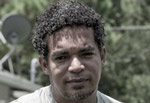 Jon Hardison, co-owner of Ha Media in Palm Coast and member of the FlaglerLive board of directors: Scout thus far isn’t quite the young lady I expected. It’s not that she’s broken, wrong or has grown into something or someone unbelievable. Just a few pages into the book you can see glimpses of the familiar here and there, but there are changes. There are hints. There are ideas one familiar with with this young lady might find jarring. I find myself giggling at her inappropriate alternatives to Henry Clinton’s advances, but am concerned for who she may have become. “Love who you like but marry your own kind” is a powerful statement, the origins of which I look forward to understanding.
Jon Hardison, co-owner of Ha Media in Palm Coast and member of the FlaglerLive board of directors: Scout thus far isn’t quite the young lady I expected. It’s not that she’s broken, wrong or has grown into something or someone unbelievable. Just a few pages into the book you can see glimpses of the familiar here and there, but there are changes. There are hints. There are ideas one familiar with with this young lady might find jarring. I find myself giggling at her inappropriate alternatives to Henry Clinton’s advances, but am concerned for who she may have become. “Love who you like but marry your own kind” is a powerful statement, the origins of which I look forward to understanding.
 Monica Campana, just-retired head librarian at Indian Trails Middle School and free-speech advocate: The heck with Atticus—he doesn’t make an appearance in Chapter 1 anyway. I want to know what happened to Scout. This young woman is no Scout. Our family loved her so that we called our daughter Scout whenever she thought for herself, conquered fears or asserted an unpopular opinion. This “Jean Louise” never learned to ride a bicycle and hates to operate anything mechanical. The Scout we admired so rode her bicycle with reckless abandon in “Mockingbird.” Riding was freedom, speed and escape. She would’ve slept with box cutters or at the very least a jackknife, so the episode where she gets stuck in the bed on the train necessitating rescue by a porter would’ve never happened—she would’ve cut her way through the mattress. Henry would have gotten a slap or perhaps even a punch in the mouth for kissing her at the station. This Scout murmurs, “Not here, Hank,” but is “much pleased.” Thank goodness Harper Lee changed her (prequel or sequel) to the admirable tough little character she was in “Mockingbird.” “Watchman”’s young lady annoys me.
Monica Campana, just-retired head librarian at Indian Trails Middle School and free-speech advocate: The heck with Atticus—he doesn’t make an appearance in Chapter 1 anyway. I want to know what happened to Scout. This young woman is no Scout. Our family loved her so that we called our daughter Scout whenever she thought for herself, conquered fears or asserted an unpopular opinion. This “Jean Louise” never learned to ride a bicycle and hates to operate anything mechanical. The Scout we admired so rode her bicycle with reckless abandon in “Mockingbird.” Riding was freedom, speed and escape. She would’ve slept with box cutters or at the very least a jackknife, so the episode where she gets stuck in the bed on the train necessitating rescue by a porter would’ve never happened—she would’ve cut her way through the mattress. Henry would have gotten a slap or perhaps even a punch in the mouth for kissing her at the station. This Scout murmurs, “Not here, Hank,” but is “much pleased.” Thank goodness Harper Lee changed her (prequel or sequel) to the admirable tough little character she was in “Mockingbird.” “Watchman”’s young lady annoys me.
 Darrell Smitty Smith, Flagler Beach AC technician, FlaglerLive contributor and George Carlin reincarnation: Well, I want to thank Pierre first of all for the copy of the book. And then for actually asking for my opinion, especially when you all have read opinions from me that have blistered paint. But as a kid, “Mockingbird” was one of the few assigned reading requirements that I was taken with and absorbed.
Darrell Smitty Smith, Flagler Beach AC technician, FlaglerLive contributor and George Carlin reincarnation: Well, I want to thank Pierre first of all for the copy of the book. And then for actually asking for my opinion, especially when you all have read opinions from me that have blistered paint. But as a kid, “Mockingbird” was one of the few assigned reading requirements that I was taken with and absorbed.
I used to read everything. Spent all my time in the library reading Popular Mechanics and books that interested me since once in the 8th grade I somehow found a copy of Nathaniel Benchley’s “The Off-Islanders” in the John White Jr. High library, about a Russian sub that washed up on Nantucket. Coolest thing in the world since it talked about the Russky sailors’ expectations of American tits, because some of them thought American girls had none from having seen a copy of Vogue, and some thought they were huge ’cause they ran across a Playboy. Oh, and it actually had the word “Fuck” in it once. Heady stuff for a 13 year old, probably influenced my joining the Navy, and here it is half a century later and it still don’t take much to keep me amused. And once in 10th Grade I almost got expelled for reading Mein Kamf behind a Geography book until I showed the principal a copy of “Oh Jerusalem! ” I had in my locker to show I wasn’t a Nazi, I was just a Sponge.
But “To Kill a Mockingbird”‘s requirement was special. It showed that the stupid-assed adults who were shoving the useless bullshit down my throat every day occasionally got it. That even their tight asses realized there was a certain value in principles and honor that made them worth studying. Displayed in a real fictional person like Atticus Finch.
And I wasn’t alone, the entire country was enthralled. A Southern woman’s first published book coincided perfectly in the early sixties with the nascent Civil Rights movement. It had the effect of not only galvanizing the Northern cognoscenti, but the entire country in a long overdue condemnation of Southern prejudice, racial injustice and plain boneheaded stupidity.
For this reason this book, this Author, meant a lot to a lot of people in this country. It gave people both young and old the seminal idea that one person could make a difference. By Atticus standing up for the flawed Tom Robinson, and showing Scout how to treat even Boo Radley with respect, one man could make a difference. One honorable man could pass on a legacy to not only his own kids, but offer up a model for others in his community to follow. This concept, this dream led a generation to believe in the power of the individual to use his or her honor, morality, and principles to guide his community to embrace the ideals of a community for the betterment of all its citizens.
And just how did we get form this beautiful Homeric Idealism of Harper Lee’s vision we all bought into to the world of Citizens United today? A world where one billionaire can buy enough airtime, commercials, think tanks and lobbyists to make us not even consider how we treat our poor, damaged, sick and stupid among us? But only consider what’s being taken from us by these parasites, these Takers. How did we let that happen?
As for “Go Set a Watchman,” the first chapter was better than expected. In case you have not heard, there was a lot of controversy regarding the publication of this novel. Harper Lee wrote it and delivered it to the publisher in 1957. The editor had her refocus the book on one flashback scene from the Jean Louise Finch story, and that became our beloved “To Kill a Mockingbird.” “Watchman” was put in a box, never to be released until now.
Lee considered it an embarrassingly rough draft of her real novel and not something she was proud of. And now that she is blind, deaf and cannot speak herself, her family and attorney “found” the manuscript in a safe deposit box. Fittingly in a bank considering all the money it’s going to make. And there are suddenly sunny little press releases from this old and by all accounts miserable lady gushing about how delighted she is to have it published. This is highly questionable, coming from a woman who was so reclusive she made J.D. Salinger look like Truman Capote.
The book starts with a grown Scout returning to Maycomb, Alabama, on a train in the then-current mid 50s. Her thoughts are on the town and roll along with a light tone. This gives Lee the chance to weave in the changes time has brought to the town and mainly to an old and arthritic Atticus. There are Lee’s usual witty turns of phrase and few of the cliched descriptions you might expect in the first chapter of a first draft of a first novel. So far, I’m hopeful that the nay-saying was just marketing hype and contrived controversy and not a reflection of the actual book. We’ll see.
 Jay Livingston, attorney with Livingston & Sword in Palm Coast: I must admit, I have no concrete recollection of “To Kill a Mockingbird.” Of course, I did read it. It was on a summer reading list either before my sophomore or junior year of high school. I do not remember if I enjoyed it or not. It was the first book I remember reading that my teachers, or perhaps the reading list itself, noted was relevant to civil rights. My understanding of that issue was complicated at the time. On the one hand I had the benefit of the sparse imperfect history of middle and highschool text books. Hero worship and simplification amounting more to propaganda than anything else. As far as the textbooks were concerned those were issues from the past. Dr. Carver gave us peanut butter and all was forgiven and forgotten. The other hand was the hour long or more bus rides I took every day across Hillsborough County without air conditioning or bathroom breaks to balance out race quotas in the inner city schools of Tampa. As monochrome neighborhoods shifted before my eyes as I stared out the window it was clear we still had a lot to learn and to work through. Any other memory of the book was washed away by snippets of the movie caught here and there as it is constantly replayed. I have never watched it from start to finish. [See the full movie here.]
Jay Livingston, attorney with Livingston & Sword in Palm Coast: I must admit, I have no concrete recollection of “To Kill a Mockingbird.” Of course, I did read it. It was on a summer reading list either before my sophomore or junior year of high school. I do not remember if I enjoyed it or not. It was the first book I remember reading that my teachers, or perhaps the reading list itself, noted was relevant to civil rights. My understanding of that issue was complicated at the time. On the one hand I had the benefit of the sparse imperfect history of middle and highschool text books. Hero worship and simplification amounting more to propaganda than anything else. As far as the textbooks were concerned those were issues from the past. Dr. Carver gave us peanut butter and all was forgiven and forgotten. The other hand was the hour long or more bus rides I took every day across Hillsborough County without air conditioning or bathroom breaks to balance out race quotas in the inner city schools of Tampa. As monochrome neighborhoods shifted before my eyes as I stared out the window it was clear we still had a lot to learn and to work through. Any other memory of the book was washed away by snippets of the movie caught here and there as it is constantly replayed. I have never watched it from start to finish. [See the full movie here.]
So I started “Watchman” knowing the names of the key characters and not much more than what are most likely inaccurate memories of my teenage life. In that partial vacuum the first chapter is wonderful. The rambling thoughts of an older wiser character returning home. A reminder that we all should ride a train even if the only reason is to be reminded of our beautiful country. Brief references of Atticus, age, arthritis. I wonder after the years have passed, his legacy set and successor chosen, if he will be satisfied with what he accomplished and what he might have sacrificed.
 Inna Hardison, co-owner of Ha Media and former publisher of Palm Coast Lifestyles magazine: There is something both lovely and clanky about the first few pages of the book for me, an awkwardness of off-beat claves. Then sudden lovely sweet tactile depictions burst through, fresh as home-grown mint and as intoxicating as too many juleps, such as the oh-ever so universally apt jibe at the conductor, for doing what any great conductor does.
Inna Hardison, co-owner of Ha Media and former publisher of Palm Coast Lifestyles magazine: There is something both lovely and clanky about the first few pages of the book for me, an awkwardness of off-beat claves. Then sudden lovely sweet tactile depictions burst through, fresh as home-grown mint and as intoxicating as too many juleps, such as the oh-ever so universally apt jibe at the conductor, for doing what any great conductor does.
I found myself on and off struggling with Scout’s character. There is a coyness to her I’m finding it hard to find believable. But it’s early, and it’s been too many years since I’ve read her voice when she was still a tiny kid, so I’ll do my best and be patient on that front.
I am not yet sure if she is giving up her swords by the simple and yet necessary–it seems–act of changing her clothing, and the almost unbearably self-aware conversations with Henry. Still trying to rasterize if his kisses are so magical that she would consider marrying him after all, assuming she is one of those sexually liberated females at this stage, or if the dictum of marrying your own kind is as much of a dictum as she’d like us to believe.
All in all, a nice job setting up the journey home, though I could have done without the bizarre cousin-poet-murderer parts. I’m sure there’ll be something relevant in her having brought it up now, just not convinced we needed to know any of it just yet. I’ll likely be wrong on that as well though, once I’m through more than this tiny snippet.
 Daniel Masbad, 2015 high school graduate (home-schooled) and concertmaster of the Flagler Youth Orchestra: These being mere impressions of the first chapter of a book, a more primitive model of criticism seems appropriate than that which will likely be employed further into the project. Though (since grand themes overarching the entirety of Western literature may not yet be apparent) I could use some form of linguistic or semiotic deconstruction to whip up some imagined substance, Derrida, Eco, and those other Europeans often lead me to be more interested in the signs than in the signified.
Daniel Masbad, 2015 high school graduate (home-schooled) and concertmaster of the Flagler Youth Orchestra: These being mere impressions of the first chapter of a book, a more primitive model of criticism seems appropriate than that which will likely be employed further into the project. Though (since grand themes overarching the entirety of Western literature may not yet be apparent) I could use some form of linguistic or semiotic deconstruction to whip up some imagined substance, Derrida, Eco, and those other Europeans often lead me to be more interested in the signs than in the signified.
To be simple about it, Harper’s (may I call her Harper?) language is not without its writerly pleasantness. However, in “the arts,” those lovely, swirly, soft disciplines, we like to erect expectations from without the medium at hand, or at least use language to such an effect. Thus in music we wish for Chopin to be poetic or Bach architectural, in poetry we might sometimes ask for painterly, sound in logic. Is Ms. Lee’s (I now regret my earlier impropriety) language poetic, architectural, painterly, or musical (the other one was a joke)? Well, as far as poetry is concerned, she mentions Sidney Lanier and that’s about the extent of it, though she did use the word yellow a few times. Oh, and there were glints in some eyes (I often wonder if I’ve ever really seen eyes glint). First chapter again comes to mind.
Issue can be taken with the really quite stilted dialogue between Jean Louise Finch and her friend-with-complications, Henry “Hank” Clinton. Like a great many television pilots, and first phases of films and novels, introducing plot points through dialogue is an enterprise that can go quite poorly and can sound inorganic, a verity of which this chapter is a fine example. The line, “Isn’t there anything they can do?” asked by Jean Louise of her father’s ailments, smarted. Along the way, we are offered what might be some fast-food feminism: Jean Louise does not wish to drive a car, equipped with automatic transmission and power steering, because “she hated to operate anything mechanical more complicated than a safety pin . ” Jean Louise has now been painted (ooh!) a poor, oppressed Southern woman, unaware of how affected she is by patriarchy. Hank’s “effortless mastery of the vehicle” makes her green with envy. I don’t think I’m reading into it, it really is just that weak. An odd contretemps follows, and some thoughts on matrimony.
This is the first chapter. I wasn’t awed or left with a great need to eat up the rest of the book in a sitting, but I was very frustrated because I do not have an inkling of what “Caesar’s hosts” are.
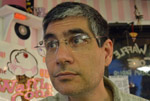 Pierre Tristam, editor of FlaglerLive: A writer’s drafts are her own until she decides to make them public or after she dies. The circumstances surrounding the supposed discovery and publication of this novel raise grim questions about how the book found hard covers, so soon after Harper Lee’s sister and protector died. News reports have danced around Lee’s mental health, doing everything possible not to suggest that she has dementia, just as family members do with one of their own no matter how much the obvious stares them in the face. The denial in this case seems less innocent, more Ewell-like. It’s not slandering her to say she had dementia, though it would also indict her handlers for making the book’s publication look more like a profiteering stunt than a service either to Lee or to literature, let alone to “Mockingbird”’s legacy. It’s almost certain that Lee has not been in full control of her capacities to sign off on a book she finished 60 years ago and clearly, for decades, did not for whatever reasons intend to publish. A trial just ended on whether a man having sex with his dementia-afflicted wife was rape. (The jury ruled it was not.) A lawyer induced Lee into publishing “Watchman,” not a husband or a sibling. As literary rapes go, this may be one for the books.
Pierre Tristam, editor of FlaglerLive: A writer’s drafts are her own until she decides to make them public or after she dies. The circumstances surrounding the supposed discovery and publication of this novel raise grim questions about how the book found hard covers, so soon after Harper Lee’s sister and protector died. News reports have danced around Lee’s mental health, doing everything possible not to suggest that she has dementia, just as family members do with one of their own no matter how much the obvious stares them in the face. The denial in this case seems less innocent, more Ewell-like. It’s not slandering her to say she had dementia, though it would also indict her handlers for making the book’s publication look more like a profiteering stunt than a service either to Lee or to literature, let alone to “Mockingbird”’s legacy. It’s almost certain that Lee has not been in full control of her capacities to sign off on a book she finished 60 years ago and clearly, for decades, did not for whatever reasons intend to publish. A trial just ended on whether a man having sex with his dementia-afflicted wife was rape. (The jury ruled it was not.) A lawyer induced Lee into publishing “Watchman,” not a husband or a sibling. As literary rapes go, this may be one for the books.
So I’m approaching “Go Set a Watchman” with dread. Reading it I feel not like a reader but a voyeur looking at something I’m not sure any of us was meant to look at, at least not yet. I’m sure that will cloud my reading, unfairly to the book, but there’s only so much we can do to take a literary work or a cultural artifact out of its context. (But what context? The context of its writing in the 1950s or of its publication in 2015?) It is certainly a cultural artifact and a work of interest for Harper Lee scholarship. Whether “Watchman” is a literary work is less certain, particularly if the first chapter is any indication.
This is not a finished text. “To Kill a Mockingbird” suffered here and there from the kind of stilted prose that drops words like “assuaged” where “calmed” or “eased” would do. But “last-will-and-testament-diction” (as Scout describes Atticus’s vocabulary in the earlier book) was only occasional in “Mockingbird.” It’s almost on every page of the first chapter of “Watchman.” If it’s not words like “discountenanced,” “egress” or “perspicacious,” it’s clichés like “a bat out of hell” appearing twice in the space of three pages, or Harlequin romance prose and cheesy alliteration (“he knew she was the one for him. He would protect her; he would marry her,” “the stony path of spinsterhood,” “I could kill you sometimes”). Even the sort of lines novelists throw in as their Great Insights fall flat: “Love’s the only thing in this world that is unequivocal.” She must not have been reading Hemingway, though we get a strong hint of what she was reading. (“Peyton Place” had already been romancing taboos for months atop the New York Times best sellers’ list when she turned in her manuscript.)
A first chapter is all set-up. “Mockingbird”’s certainly was, dwelling more on the children’s environment and Boo Radley than anything to do with race, though the chapter was rich in threads of the narrative quilt to come. There’s not much of that here other than Jean Louise’s anticipation as she returns to her Deep South. The observations in the train are forgettable, the bit about the conductor flirtatiously going past Jean Louise’s station a few hundred yards not really believable, her Kardashian-like self-absorption, despite the third-person narrative, oddly more pronounced than when she was a child.
What there is, especially from Henry Clinton, unhelpfully reminds the reader of a later cad of the same name as he tells Jean Louise how to be an enchantress: “Don’t argue with a man, especially when you know you can beat him. Smile a lot. Make him feel big. Tell him how wonderful he is, and wait on him.” Jean Louise for her part gives us a Zapruder-type film of how she imagines her life with Henry would roll by, if she were to marry him, a paragraph of serrated wit and suburban heartbreak John Updike would have envied. But one paragraph isn’t worth the price of admission. If the relationship between a more pugilist Mary Tyler Moore and the Bo half of the Dukes of Hazzard is going to be the central thread of this book, we’re in for a long read.





























NortonSmitty says
Wunnerful!
Sherry E says
Ahhhh, Dear Pierre. . . for one, I’m delighted to see a bit of “fluff” in Flagler Live. . . fertilizer for the roots of healthy and positively educated cultures! More please, she said!
Brian McMillan says
Pierre, I wonder if you’re being too hard on Jean Louise’s line about love being unequivocal. After all, the line from “Mockingbird” about walking around in a man’s moccasins could be considered a sort of cliche, and not just because it was made famous in “Mockingbird.”
It seems that because of the way the novel was published, it is easy to point out flaws that could otherwise be praised if we gave her the benefit of the doubt. In “Mockingbird,” if the phrase “bat out of hell” showed up twice in three pages, for example, we might be looking for ways to interpret her use of cliches as a device for characterization, rather than saying it was a blatant mistake.
Obviously, I don’t know how “finished” Lee considered the book, so this is all speculation … For some reason, I like the idea of treating it as art, rather than a sloppy draft.
Pierre Tristam says
Brian, I think the flaws in this book stand on their own, regardless of their history. I think all of us here are bending over backward to give the book the benefit of the doubt but having a very difficult time of it because of what, to some of us, reads like an inherent lack of quality that just can’t be spun with any kind of happy faces. The book ultimately must be read on its own two hard covers and I think will be, but its history seems to confirm what some of us suspect—that Lee didn’t wan t it published for a reason (it’s not up to standard) and it should probably never have been published under the pretensions of an accomplished novel on par with “Mockingbird.” It might have worked better as a sort of lost draft like some of those lost Honeymooners episodes, though the Honeymooners lost or not were better than anything I’ve read so far in Watchman.
I disagree that the bit about walking in another person’s skin was a cliché in “Mockingbird.” We’ve made it one by adulterating it into one, but when Lee wrote it, it was not a cliché for a couple of reasons: first, the sentence Atticus uses is itself more lyrical than what most of us remember, and it’s part of that broader exchange with Scout, who we should remember is about 6 at the time:
“First of all,” he said, “if you can learn a simple trick, Scout, you’ll get along a lot better with all kinds of folks. You never really understand a person until you consider things from his point of view—”
“Sir?”
“—until you climb into his skin and walk around in it.”
It’s more inventive and anti-cliché a way of saying what Elvis would reduce to walking a mile in a man’s shoes (though Scout herself uses that image too a few lines down). But more interestingly, it occurs at the culmination of chapter three—one of those richly textured chapters that so far have not even the echo of an equal in “Watchman”—where Scout starts by beating up Walter Cunningham, Cunningham is invited to the Finch house, Scout is rude to him, Calpurnia and Scout have a key confrontation where she actually smacks her (and later kisses her in one of the book’s rare tender moments), and all that before another day at school where Scout tries to explain Maycomb dynamics to her teacher, all for Scout to decide she doesn’t want to go to school anymore. That’s when Atticus intervenes with his little lesson, and only to compel Scout to have a little empathy for her teacher. The construction of the chapter is as interesting as its substance, and there’s richness in both.
But it’s also notable that Atticus’s lesson is focused on the teacher (it stands in odd and inferior contrast to Calpurnia’s sharper lesson a few pages earlier, but a black maid’s lesson no matter how truer can’t rival the great Atticus). That bit about Atticus focusing on the teacher is notable I think because on the same page that stands out as a gem in the book, we also see the book’s most characteristic flaw. Just a few lines down Atticus shows no desire to walk in the daddy Ewell’s drunken. He only derides him to no end. There’s no attempt wither on Lee’s or on Atticus’s end to understand a whit of Ewell’s history, which would have diminished the caricature but made for a more interesting, if less popular, book.
Either way, that richness in Mockingbird is at least palpable on most pages even if it’s ultimately a bit shallow. In Watchman I’m not finding so much as a few pleasurable puddles to wade in. Maybe they’re ahead. I certainly hope so.
Oldseadog says
WOW
What a great concept………………….and fantastic first chapter reviews by such varied styles of
these local reviewers. When I first saw the initial ads for the book itself, I thought I would not ever
read it as I did not want to destroy my memories from so long ago of having to read the wonderful
“To Kill a Mocking Bird” novel.
I certainly look forward to reading the reviews of these talented reviewers of the remaining chapters!
I’m renewing my former reading pleasures of many of the old classics that I was forced to read in
school eons ago in high school by the fantastic modern technology of e-books which allow those of
us getting along in years to download and adjust size and fonts of our books.
Thank you Pierre for the concept and your choice of reviewers !
Donna De Poalo says
Well…I bought the book so I could read along. So far I am enjoying the comments more than the book. ;-)